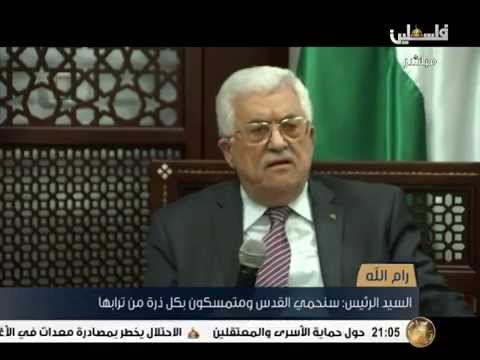In a speech just hours after a Palestinian terrorist rammed his car into pedestrians in Jerusalem earlier in the week, injuring 12 Israelis (including a 15-month-old baby), PA President Mahmoud Abbas referred to the last three months of Palestinian violence as a “justified popular uprising“. This violence – shootings, stabbings and car-ramming attacks which have killed 22 and injured over 250 – stems, he claimed, from “the invasion of the Al-Aqsa Mosque”, a deceitful and incendiary charge used by Palestinian leaders for over 100 years to incite the murder of Jews.
This wasn’t the first time the Palestinian President implicitly endorsed terror. In September, Abbas, during an interview on PA TV, explained that he “welcomed every drop of blood spilled in Jerusalem”.
Of course, these comments shouldn’t come as a shock to anyone familiar with Abbas’s previous acts of rhetorical incitement, such as when he lied when claiming, on PA TV, that Israel “executed” a 13-year-old Palestinian boy – a teenage terrorist who was injured but, in fact, very much alive.
The media’s failure to focus on Abbas’s terror justification of course raise serious questions about double standards.
Whilst Israeli leaders are called out on far less egregious instances of inflammatory rhetoric and demagoguery, it seems clear that journalists, editors and contributors to UK news sites – wedded as they are to the narrative of a ‘moderate’ PA president – won’t substantively call out Abbas on his moral defense of attacks on Jews.
Why? Because, if British media outlets were to take seriously Abbas’s recent statements, they’d need to question their broader assumption that Abbas is opposed to violence and represents a population of Palestinians interested in peace with the Jewish state. And, if there is one common thread which characterizes the media’s institutional bias, it’s their collective failure to take Palestinians seriously as agents of their own fate. The Israel-Palestinian story, former AP Jerusalem correspondent Matti Friedman argued, mandates that Palestinians exist merely “as passive victims”.
Since they are the weaker party, this line of reasoning goes, holding Palestinians accountable for their moral failures and decidedly illiberal tendencies, such as endemic antisemitism and the glorification of violence, is “blaming the victim” – part of a political orientation which automatically assigns virtue to those in possession of less economic, social or political power.
Abbas’s endorsement of antisemitic hate crimes won’t become a big story in the UK because it’s simply not part of the desired narrative about the conflict, nor consistent with the ideological assumptions which inform their facile David vs Goliath tale.
Related articles
- Letter to the Editor: Israeli and Palestinian leadership (cameraoncampus.org)





